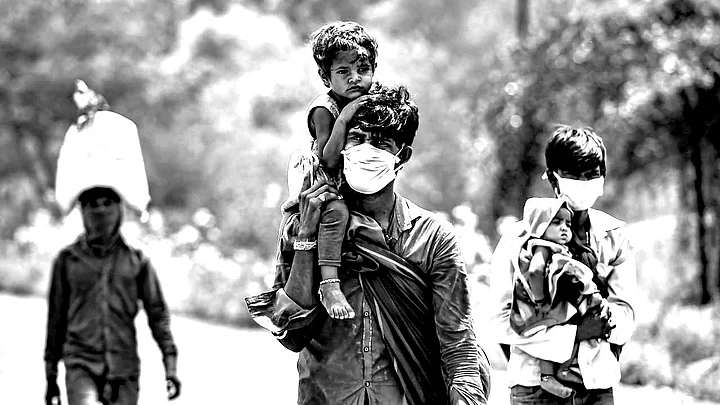The painful visuals will fade – of migrant workers walking hundreds of kilometres from indifferent cities to reluctant villages. Yet, their children will always remember this exodus and the valuable lessons they learnt on how to survive in India.
The children walked carrying their own loads, learning how to stay alive in the summer heat without food or water. Some made it, some didn’t. Like the 12-year-old girl who died on her way from Telangana to Chhattisgarh, a distance of about 150 km. She began walking from the Jayashankar Bhupalpally district and died three days later, one hour away from her home in Bijapur district.
She was employed in the chilli fields, leaning how to live in a country that does not take care of poor children, so that they did not have to earn.
The children also learnt patience with the gods of democracy, as they stood waiting just 16 kilometers from the Parliament in a 3-km-long queue outside Delhi’s Anand Vihar bus terminal, where thousands of migrant workers waited for transportation.
Children Understand, Children Learn
Of the total 13.9 crore migrant workers in the country, over 54 % are in Mumbai and 42 % are in Delhi (Census, 2011). They build every powerful minister’s home/office with their bare hands.
Then why do the tall gates remain closed to them? Because the poor carry the dirt of the land onto the marble floors.
And the children understand that.
The ‘barefoot migration’ during lockdown, estimated by Government of India, is between 5,00,000 to 6,00,000. Do the poor compare themselves to those Indians who were fetched home by air? Why did not the most hardworking people in the country get transportation? Because the poor can walk, without protest, without power.
And the children learn how.
Their parents vote in every so-called ‘free and fair’ election held according to the rules devised by the influential classes. So, what do the migrant workers think of the Constitution, the Parliament, the democracy that cannot even ensure minimum wages? Who among them would have even a day’s extra wage to protest against the system? The chains are not broken, they are just invisible.
And the children are born in these chains.
Children Will Not Fade Away
If they had a voice, what would the migrant workers say about the photo-ops of the government aid, and about the ‘sensitive’ class that equates success with wealth? Perhaps, they would wonder how they remain poor, despite the ‘good people’ and despite the enormous power that the articulate classes wield over the decision-makers. What if they claimed everything they built?
The children of the poor would inherit all of India.
The visuals will fade, as they always do.
In time, every high consumption, tax-paying, politically clear but ideologically ambivalent citizen will come to believe that, what is not visible, does not exist.
But, it may not be that easy this time, because of the children.
They are born on the footpaths and the construction sites. They grow up in the narrow spaces between the wide SUVs in city traffic. They play in the debris of aspiration of urban citizens and they dream outside the gated communities that live such dreams.
Children Will Remember
These barefoot children, whom India ejected from its cities – will they ever be equal? Will they ever live in dignity? If yes, then that would be the end of the tragedy of India.
Until then, there is no escape for every citizen of this country to feel the heat of every kilometer these families walked, the humiliation of every ‘photo-op charity’ they got, and the fear of every decision, every violence of the state. Because the children will remember. And this is not the end.
(Dr. Kota Neelima is author and researcher, and writes of rural distress and farmer suicides. Her recent book is titled ‘Widows of Vidarbha, Making of Shadows’. She can be reached on kotaneelima@hotmail.com and tweets @kotaneelima. This is an opinion piece and the views expressed above are the author’s own. The Quint neither endorses nor is responsible for them.)
